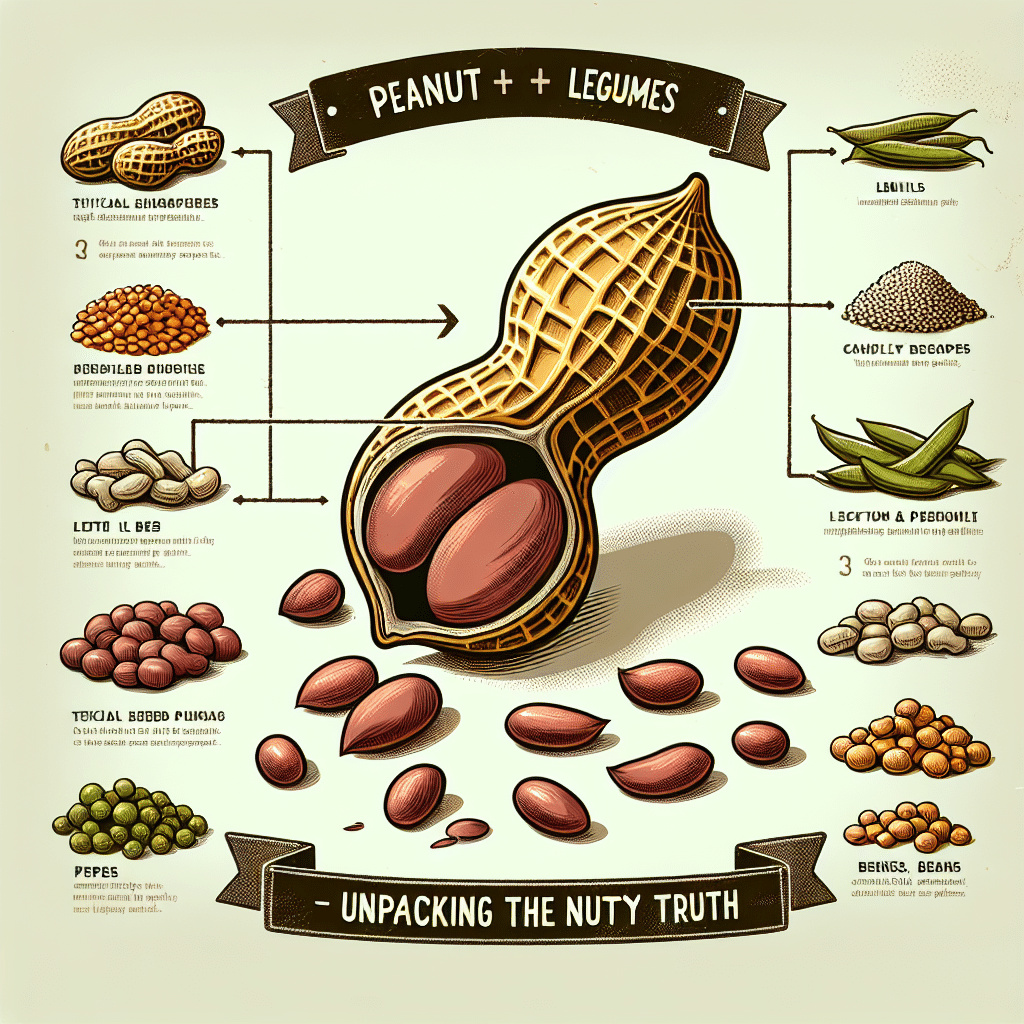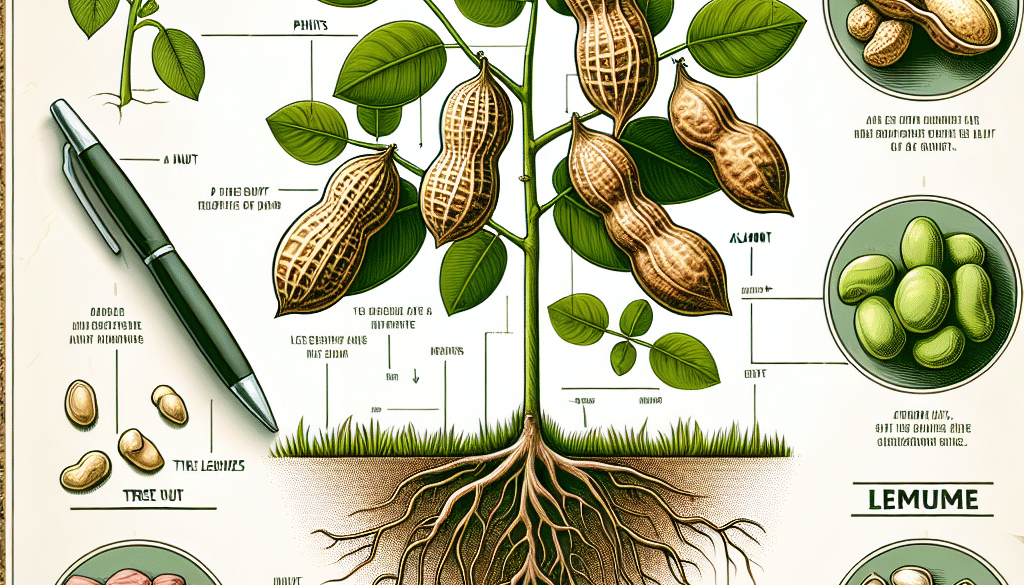Are Peanuts a Legume? Unpacking The Nutty Truth
-
Table of Contents
- Are Peanuts a Legume? Unpacking the Nutty Truth
- Botanical Background: Peanuts Defined
- Nutritional Profile of Peanuts
- Peanuts in Diets and Cuisines
- Health Benefits and Risks
- Environmental Impact of Peanut Cultivation
- Conclusion: Embracing the Legume Identity
- Discover ETprotein’s Plant-Based Protein Products
Are Peanuts a Legume? Unpacking the Nutty Truth

When it comes to peanuts, there’s a common misconception that they belong to the tree nut family. However, the truth is much more complex and fascinating. Peanuts are indeed a legume, a fact that surprises many due to their culinary and nutritional similarities to nuts. In this article, we will delve into the botanical classification of peanuts, explore their nutritional profile, and discuss their role in various diets and cuisines. By unpacking the nutty truth about peanuts, we aim to provide valuable insights and clear up any confusion surrounding this beloved snack.
Botanical Background: Peanuts Defined
Peanuts, scientifically known as Arachis hypogaea, are a member of the legume family, which includes beans, lentils, and peas. Unlike tree nuts, which grow on trees, peanuts develop underground, which is why they are also referred to as groundnuts. The peanut plant flowers above the ground, but after pollination, the flower stalk elongates and bends towards the ground, burying the fertilized ovary underground where the peanut matures.
- Legume Characteristics: Legumes are known for their ability to fix nitrogen in the soil, which enhances soil fertility. This characteristic is shared by peanuts, making them an excellent crop for agricultural rotation.
- Seed Pods: Peanuts develop in a shell or pod containing multiple seeds, which is another hallmark of legumes.
Nutritional Profile of Peanuts
Peanuts are not only a tasty snack but also a powerhouse of nutrition. They are rich in protein, healthy fats, vitamins, and minerals, making them a valuable addition to any diet.
- Protein: Peanuts contain about 25-30% protein, which is higher than any true nut.
- Healthy Fats: They are also high in monounsaturated and polyunsaturated fats, which are beneficial for heart health.
- Vitamins and Minerals: Peanuts are a good source of B vitamins, vitamin E, magnesium, phosphorus, and potassium.
- Fiber: With a significant amount of dietary fiber, peanuts can aid in digestion and promote a feeling of fullness.
- Antioxidants: Peanuts contain antioxidants such as resveratrol, which is also found in grapes and red wine.
Peanuts in Diets and Cuisines
Peanuts have found their way into various diets and cuisines around the world. They are versatile and can be consumed raw, roasted, boiled, or as part of various dishes and products like peanut butter, sauces, and desserts.
- Vegetarian and Vegan Diets: Due to their high protein content, peanuts are an excellent meat alternative for those following plant-based diets.
- Gluten-Free Diets: As a naturally gluten-free food, peanuts are suitable for individuals with celiac disease or gluten sensitivity.
- Culinary Uses: In African and Asian cuisines, peanuts are commonly used in stews, curries, and as garnishes for salads and noodle dishes.
- Snacking: Peanuts are a popular snack, especially when roasted and seasoned with salt or spices.
Health Benefits and Risks
While peanuts offer numerous health benefits, there are also risks associated with their consumption, particularly for individuals with peanut allergies.
- Heart Health: The monounsaturated fats in peanuts can help lower bad cholesterol levels, reducing the risk of heart disease.
- Weight Management: Peanuts have a high satiety factor, which can help in controlling appetite and managing weight.
- Peanut Allergies: Peanut allergies are one of the most common food allergies and can be life-threatening. It is crucial for individuals with peanut allergies to avoid peanuts and peanut-containing products.
Environmental Impact of Peanut Cultivation
Peanut cultivation has both positive and negative environmental impacts. On the one hand, peanuts enrich the soil with nitrogen, reducing the need for chemical fertilizers. On the other hand, peanut farming can be water-intensive and may contribute to deforestation if not managed sustainably.
Conclusion: Embracing the Legume Identity
In conclusion, peanuts are indeed a legume, sharing more characteristics with beans and peas than with tree nuts. Their unique growth process, nutritional benefits, and versatility in cooking make them a valuable food source worldwide. Understanding the true nature of peanuts can help consumers make informed dietary choices and appreciate the diversity of legumes. Whether enjoyed as a snack or incorporated into meals, peanuts are a nutritious and delicious option that deserves recognition for their legume heritage.
Discover ETprotein’s Plant-Based Protein Products
If you’re looking for high-quality plant-based protein options, consider ETprotein’s range of products. Their selection includes organic rice protein, clear rice protein, pea protein, clear pea protein, pumpkin seed protein, sunflower seed protein, mung bean protein, and peanut protein. These products are non-GMO, allergen-free, and have a neutral taste, making them perfect for various applications in the food and beverage industry. Whether you’re a distributor, trader, or manufacturer, ETprotein can meet your protein needs with their extensive product range.
About ETprotein:
ETprotein, a reputable protein Chinese factory manufacturer and supplier, is renowned for producing, stocking, exporting, and delivering the highest quality organic bulk vegan protein and plant proteins. They include Organic rice protein, clear rice protein, pea protein, clear pea protein, pumpkin seed protein, sunflower seed protein, mung bean protein, peanut protein etc. Their offerings, characterized by a neutral taste, non-GMO, allergen-free attributes, cater to a diverse range of industries. They serve nutraceutical, pharmaceutical, cosmeceutical, veterinary, as well as food and beverage finished product distributors, traders, and manufacturers across Europe, USA, Canada, Australia, Thailand, Japan, Korea, Brazil, and Chile, among others.
ETprotein specialization includes exporting and delivering tailor-made protein powder and finished nutritional supplements. Their extensive product range covers sectors like Food and Beverage, Sports Nutrition, Weight Management, Dietary Supplements, Health and Wellness Products, and Infant Formula, ensuring comprehensive solutions to meet all your protein needs.
As a trusted company by leading global food and beverage brands and Fortune 500 companies, ETprotein reinforces China’s reputation in the global arena. For more information or to sample their products, please contact them and email sales(at)ETprotein.com today.












